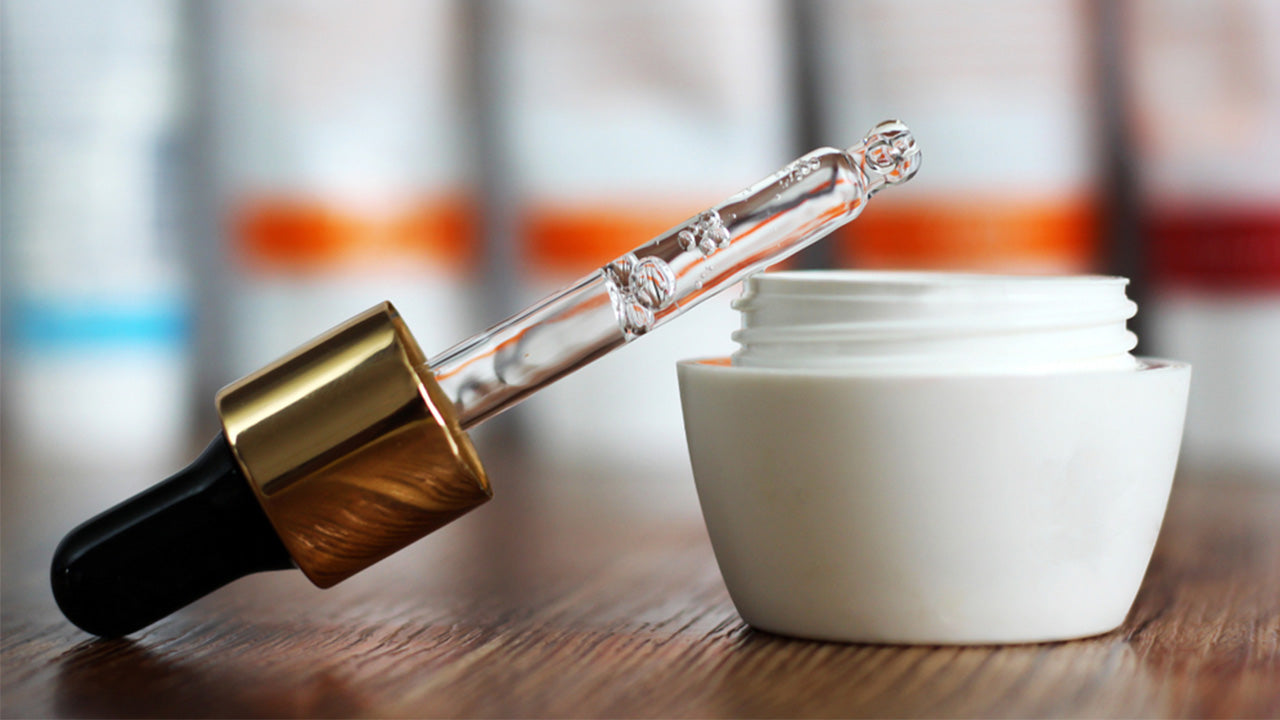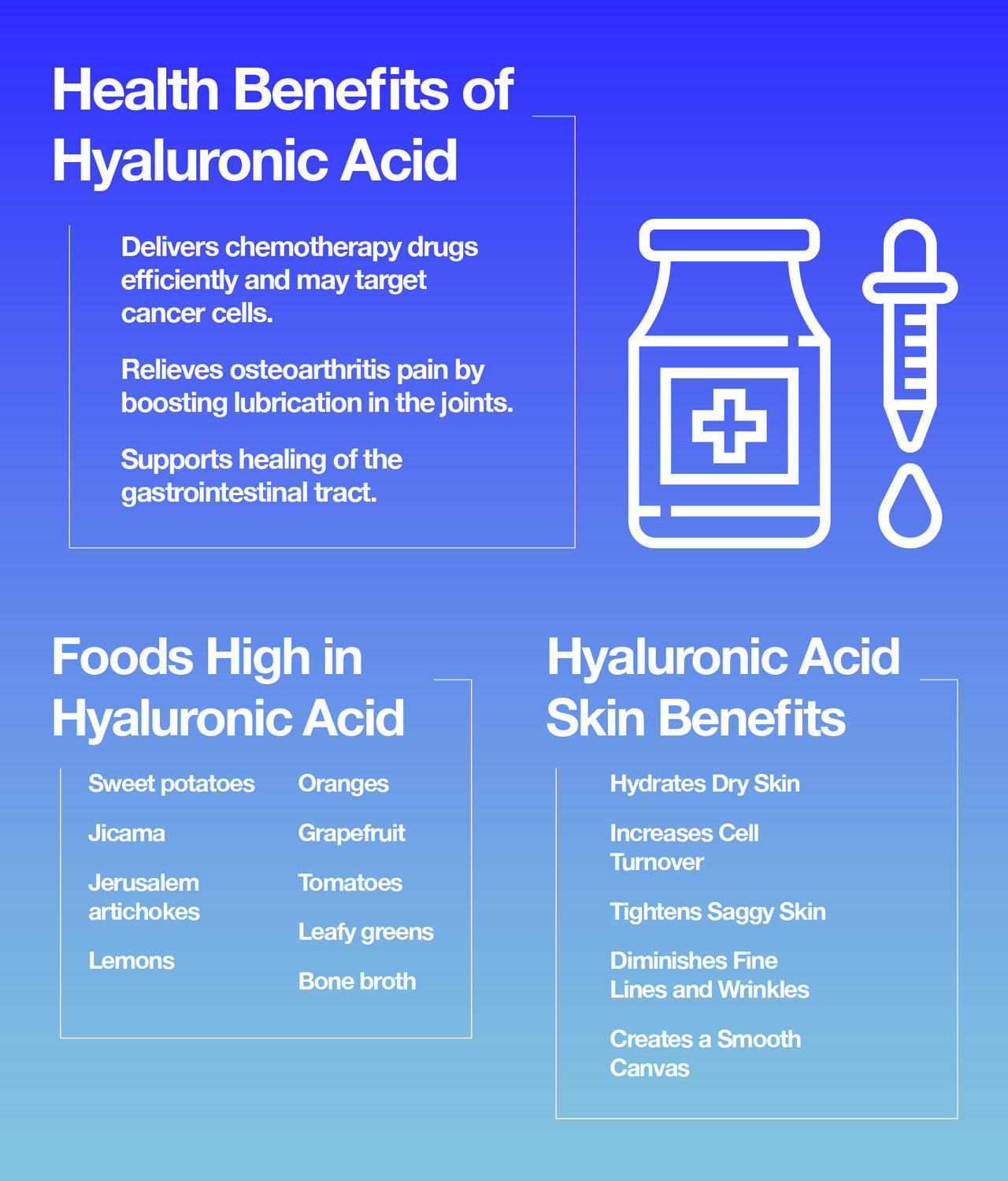Hyaluronic Acid Benefits More Than Just Your Skin
 By: by Amino Science
By: by Amino Science

Countless beauty products tout hyaluronic acid’s ability to fight acne, age spots, and wrinkles. Dermatologists use hyaluronic acid to plump lips and other tissue, and some in the industry refer to it as the “fountain of youth.” But hyaluronic acid benefits extend far beyond topical skin care.
In the human body, hyaluronic acid is found in joints and the eyes where it acts as a protective lubricant. The FDA has approved hyaluronic acid for use during cataract surgery, corneal transplants, and other eye surgeries to replace the eye’s natural fluids during these procedures.
What Is Hyaluronic Acid?
Hyaluronic acid is essentially a lubricant that plays a role in cushioning joints and surrounding connective tissues and keeping the eyes moist and hydrated. In research, hyaluronic acid is often referred to as hyaluronan. This naturally occurring lubricant binds to water molecules and creates a texture similar to gelatin.

3 Internal Health Benefits of Hyaluronic Acid
Anti-aging products may be the most well-known use for hyaluronic acid, but research proves it offers extraordinary health benefits, including in the fight against cancer.
1. Delivers Chemotherapy Drugs Efficiently
According to a study published in the Journal of Surgical Research, when hyaluronan is used as a drug delivery method in the fight against breast cancer, it effectively targets lymphatic metastases without damaging surrounding tissue in animal trials. The researchers of the study urge human trials to determine the full potential of hyaluronic acid as a chemotherapy drug carrier.
Supporting the above study, a recent study published in the journal Drug Delivery states that hyaluronic acid can act as a delivery vehicle for certain medications, including chemotherapy drugs. The researchers point out that hyaluronic acid has the ability to recognize specific receptors on tumor cells and that larger scale clinical trials are necessary. There are currently 44 clinical trials studying hyaluronic acid and its safety and efficacy in the treatment of a wide range of cancers.
2. Relieves Pain Associated with Osteoarthritis
Osteoarthritis is a degenerative disease that affects an estimated 70% of people over the age of 65. Over time, this type of arthritis pain becomes more and more difficult to relieve, which leads to limited mobility and poor balance.
The human body's production of hyaluronic acid slows as we age, causing the tissue around the joints to have less cushion and lubrication and resulting in pain. Hyaluronic acid injections are approved by the FDA for the treatment of osteoarthritis of the knee, and research indicates hyaluronic acid injections can provide up to six months of pain relief.
Partnering hyaluronic injections with an osteoarthritis diet rich in healthy oils, cold-water fish, nuts and seeds, and green leafy vegetables may improve pain levels. The foods highest in hyaluronic acid include:
- Sweet potatoes
- Jicama
- Jerusalem artichokes
- Lemons
- Oranges
- Grapefruit
- Tomatoes
- Leafy greens
- Bone broth
3. Supports Intestinal Wound Healing
Researchers from the Cleveland Clinic's Lerner Research Institute have found that hyaluronan fights inflammation and promotes healing of the intestines in multiple clinical trials. The author of the report points to chronic inflammation as being a “major predisposing factor to fibrosis in all organs including the intestine" and states that hyaluronan may promote natural healing processes in the gastrointestinal tract as inflammation decreases.
Hyaluronic Acid Benefits for Skin
Now that we’ve addressed what hyaluronic acid can do inside the body, let’s take a look at why many skin care companies use hyaluronic acid as a key ingredient in their products. A clinical study published in the journal Dermato-Endocrinology showed that hyaluronic acid exhibits different traits than other skin care ingredients.
The authors of the study indicate that hyaluronic acid demonstrates a unique capacity for retaining moisture and the ability to work within different layers of the skin. The study specifically notes that skin health and texture is affected by hormonal changes, exposure to ultraviolet radiation, and aging, and that further study of hyaluronic acid could lead to “novel treatments” in skin aging.
Take a look at hyaluronic acid’s benefits for the skin.
- Hydrates dry skin: Hyaluronic acid may promote proper moisture in the skin—even oily skin—without causing acne.
- Increases cell turnover: Hyaluronic acid is believed to increase cell turnover, leaving the skin smooth and vibrant.
- Tightens saggy skin: Hyaluronic acid may tighten saggy skin and improve elasticity, thereby creating a better overall complexion and texture.
- Diminishes fine lines and wrinkles: Hyaluronic acid helps to reduce the appearance of fine lines and wrinkles by plumping up the areas with moisture.
- Creates a smooth canvas: Hyaluronic acid in serum form smoothes out the skin, allowing makeup to glide over and not nestle into imperfections.
Supplementing with Hyaluronic Acid
Taking hyaluronic acid orally as part of your anti-aging supplement plan, particularly in conjunction with collagen, is generally safe to use with few reported side effects. Allergic reactions to hyaluronic acid are rare.
In addition to supplementing with hyaluronic acid, essential amino acids can help with everything from wound healing to skin support. Find out how essential amino acids benefit your health here.

Up to 25% off Amino
Shop NowTAGS: anti-aging natural cures
Join the Community
Comments (0)
Most Craveable Recipes




 833-264-6620
833-264-6620



















